Some organizations raise money to support artists or fund public art projects. Others seek to raise awareness of specific issues through art. For Carol Hofgartner, founder and executive director of Art Road, an arts education nonprofit headquartered in Livonia, Michigan, providing art education to Detroit public schoolchildren without access to regular art classes is a means of instilling an appreciation for art and securing their futures. A former architectural liaison for the international automotive supplier, UT Automotive, Inc., in Dearborn, Hofgartner founded Art Road in 2004.
Together with the help of volunteers, Bloomfield Hills Cranbrook Academy of Art graduates, and local artists, Art Road brings art instruction to Detroit Public Schools that have had to cut art from their curriculum due to budget cuts.
In partnership with The Michigan Glass Project, a 501(c)(3) nonprofit of glass artists based in Detroit, Art Road currently serves five Detroit area schools.
Hoftgartner’s ongoing efforts to bring art classes to Detroit’s underserved public school students represent the UN Sustainable Development Goals (SDGs): 4. Quality Education, 10. Reduced Inequalities, and 16. Peace, Just, and Strong Institutions. Arts Help spoke to Carol Hofgartner on August 9, 2021. This conversation has been lightly edited for length and clarity.
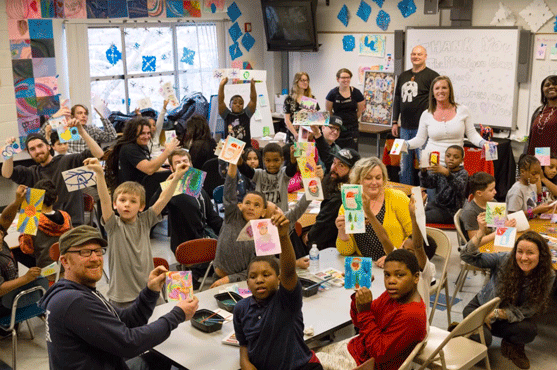
You are an architect with a master’s degree in Architecture from the University of Michigan. Did you take any art or art history courses in college? Do you have any favourites?
I took art and art history courses as an undergrad; and for my post-masters, I studied art at a villa in Italy. At the time, I was working for a corporation [UT Automotive] and was able to take a leave of absence for seven weeks, partially paid for by the corporation, to go study art and art history in Florence. I loved to sketch. We went to different museums, and when the professor would talk about a certain piece of art, I would sketch the art and write about what I saw.
While my classmates were doing ten-page papers, I sketched the whole time and handed that in. It was more about the process than any specific period. Instead of writing about what I was seeing, I drew and created a showpiece. I struggle with words and writing, but I am good at drawing and creating in my mind.
For me, art is not about a particular artist or when a piece was made, rather, the feeling of being immersed in art by hand than in the brain.
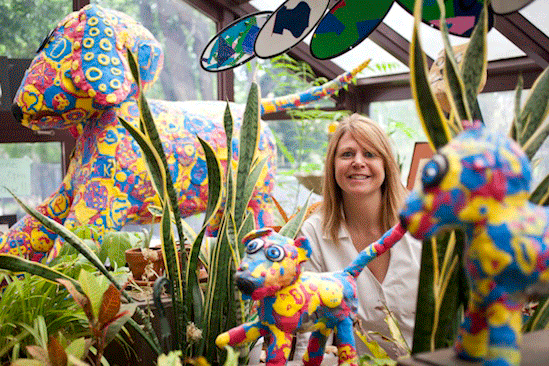
Tactile sketching and the process of making have always been very important to me. Art has changed my life. Through art, I’ve been able to travel the world. Without my love of art, I probably would not have travelled as a young person.
In a 2011 interview with Melinda Clynes of Model D online magazine, you said that your mission to reintroduce art classes to Detroit students began in 1995, when you were asked to speak about architecture at a career day at Weatherby Elementary school, now closed, which led to seven years of volunteering at the school. How did your years as a volunteer art teacher influence the development of Art Road Nonprofit’s vision?
Almost 30 years ago, I went to a career day at my friend Lisa’s school in Detroit, Weatherby Elementary School, to talk about architecture and what an architect does. I held up a boat I made in fourth grade and said just like in your class, I made this artwork. A boy said, “Miss Carol, we don’t have art.” I couldn't believe these kids didn't have art.
I volunteered at Weatherby in my friend Lisa’s classroom for seven years. I would go on my lunch hour and bring in art supplies, teach the students different techniques, art history, and about artists. I also brought in automotive designers–anyone I could get to come to the classroom and talk to the students. I would come to the school and the kids would literally race in, even in the winter, ripping off their coats and ready for art. The timing was right. I thought I could be doing more and that was where the foundation for starting Art Road came from. I wanted children to have the same sense of joy and accomplishment that I have had through art.
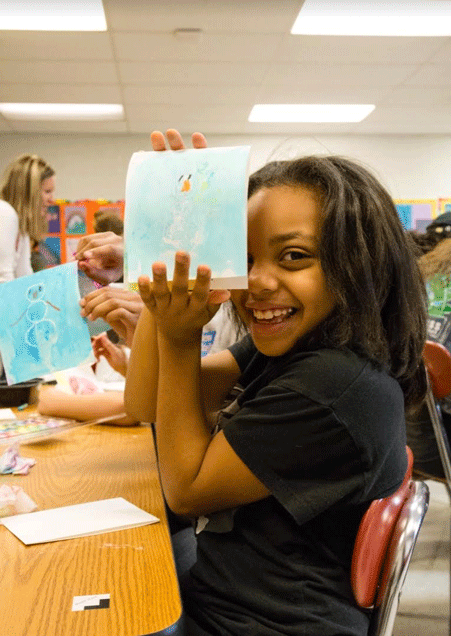
In the same Model D interview, you spoke about being inspired to become an architect by your experience in elementary school art class as a child growing up in Dearborn. How did those childhood art experiences affect you as an adult?
I grew up in Dearborn Heights, a historic city. I have three older siblings, and a younger sibling. When I was in fourth grade, my parents renovated the four-story house of the Henry Ford Museum’s PR person in Dearborn for a year. They would load us up in a van and take us to the construction site.
Every week, it was a different lesson. While some kids played after school, we went and renovated this big old house. I learned firsthand about how to sand a floor and strip wallpaper. I really liked it. I was on fire with renovating, art, and architecture. If it were not for my parents’ creativity and hands-on ingenuity, I would be a different person.
Does your background as an architect influence the way you approach teaching art?
Art and architecture have shaped my life. In terms of the arts, I was like; “Wow, I guess I’m kind of good at this.” We are all artists. As Pablo Picasso said; “Every child is an artist. It’s just a matter of how we stay artists as we grow up.” A lot of our donor individuals come to us. As I grew, I wanted to share art with others. I found this whole community of individuals that felt the same way, art had changed their lives or helped save their lives.
Art Road became a family of like-minded people who believe art is important. I have been very fortunate to do art and what I loved from when I was little. Art is one of our first languages. To still be connected to art as an adult is incredible.
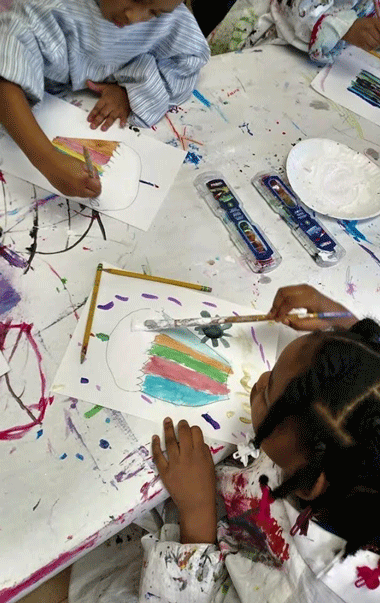
You recruit Cranbrook Academy of Art graduates to be art teachers at Art Road’s partner schools. How did that relationship originate? What is the screening process for selecting candidates?
The Cranbrook Academy of Art graduates are paid teaching artists. They are not volunteering for me. It is important to me to select graduates because I want the students to go from no art to the best in the world. We have that right in our own backyard from artists who are graduates of all these institutions including Cranbrook, the College for Creative Studies, and Wayne State University.
We employ our artists to teach all year long at the schools in dedicated art rooms, funding the supplies and providing the art instructor. We invite volunteers to come through the process that the schools have set up. We do it through dollar donations and donated supplies. We have organizations that do supply drives for us. Through fundraising we are also able to get supplies based on the individual needs of our teaching graduates.
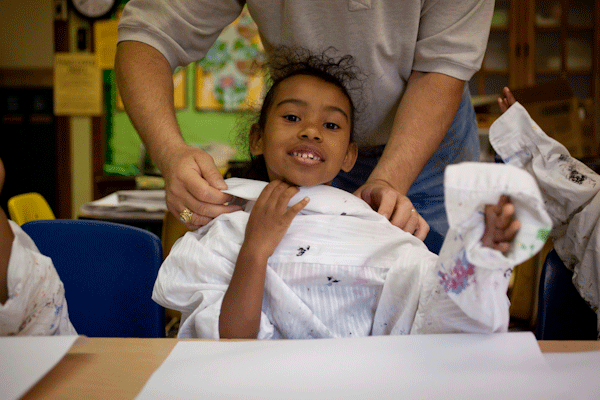
Since 2015, Art Road has been the beneficiary of funds raised by the Detroit-based nonprofit, the Michigan Glass Project. How did that partnership originate?
I still remember the day. It was 11:00 on a Friday night in 2015. It was snowing and my husband and I were in Frankenmuth on an overnight trip. I was checking my email and I saw that Allison Key, one of the cofounders of the Michigan Glass Project had reached out to me in this beautiful email saying that she had been searching for a nonprofit in Detroit, believed in art education, and asking if I would be open to conversation. I thought; “Wow, this is going to be amazing.” We do get asked a lot to engage with other organizations.
I had this tremendous feeling. We met at a coffee shop with Drew Kups, the other co-founder of the Michigan Glass Project, and it was just magical. They shared their vision of the Michigan Glass Project, art that gives back, and they had already reached success doing their weekend glass festivals. They were looking for nonprofits to match what they do, meaning the arts. Fast forward to now, we are the beneficiary. It has been an incredible experience, all these individual glass artists coming together to make art and Art Road is the beneficiary.
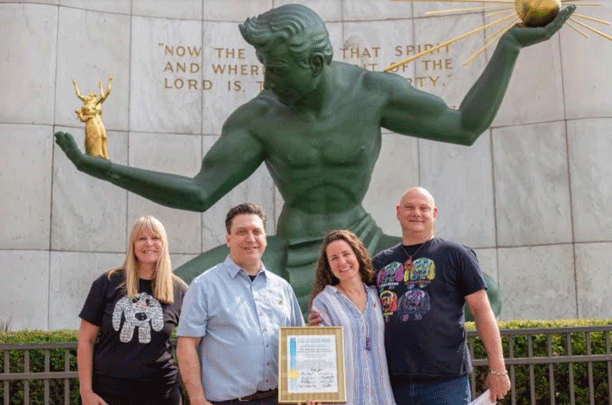
In the past, the three-day glass festivals have been held in July at the Russell Industrial Center in Detroit [the headquarters of the Michigan Glass Project] with glass artists from Michigan and across the United Sates making art live. All the glass works made during the festival are auctioned off for charity with the proceeds going to Art Road. This year, with the pandemic, the festival is going to be a virtual event in the fall.
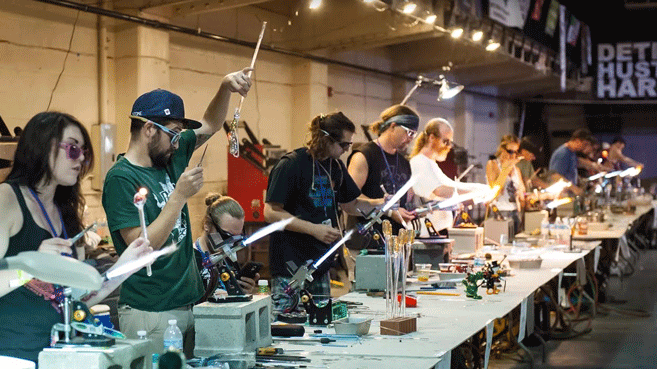
Currently, Art Road Nonprofit serves five Detroit area schools. Do you have plans to expand Art Road’s art education program to more schools?
Yes, down the road, we would love to expand. We are grateful for the partnerships that we have with the Detroit Public Schools Community District. We are welcomed with open arms by the partnership department and all fine arts departments. At the end of the year, we invite local artists to come speak to the students and make an art project together.
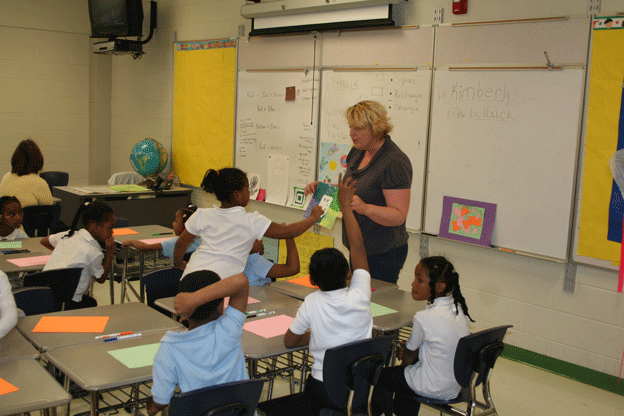
Since 2013, we have partnered with Detroit arts consultant Rick Sperling [founder, former president, and retired artistic director of the Mosaic Youth Theatre at the Detroit School for the Arts] doing his Pathways Program at the Detroit School for the Arts connecting high school students with college art opportunities. We are utterly humbled to work with the Detroit Public Schools Community District, their principals, and the students. The teachers are so engaged. It is a great partnership.
According to a Fox 2 Detroit article from May 20, 2020, you and Art Road put together do it yourself art kits and created ART NOW, a series of art lessons through Comcast Xfinity On Demand for children to do at home with their families when the pandemic curtailed Art Road's in-person involvement. How have these art kits and accompanying video lessons been received by Detroit school children and their families?
The art kits and [ART NOW] video lessons were very well received by the students and parents. One parent said he wanted a kit to do the art lesson right along with his child. One mom said she would like extra art kits to have for neighborhood kids too. Numerous students jumped up and down and could not wait to see what was in the art kit. A group of students said it was going to be the very first thing they did when they got home, art. When we posted our art lessons on Art Road social media, parents across the country chimed in that they would be downloading the art lessons for their kids.
As a nonprofit, do you receive money through Art Road's involvement with Detroit public schools and board members, or is it entirely funded through monetary donations, fundraising events, and Michigan Glass Project's annual glass-blowing festivals?
Art Road receives no funding from the schools we serve.
Currently are there plans to resume in-person art classes?
There are no plans yet for the 2021-2022 academic year. In September, we will have a better understanding of how we are going to bring our program to the schools depending on the teaching methods the Detroit Public Schools Community District decides to use. However, we are currently accepting donations of art supplies and funding for the 2021-2022 school year.
The artist Edgar Degas once said, “Art is not what you see, but what you make others see.” Other than making a difference in the lives of Detroit school children, do you feel like your art classes change minds and convince school administrators to see the value of art education in nurturing children’s creativity?
Exposing students to art is about more than making a difference. Art Road is not just having people sitting in and getting kids involved and engaged in art, it is about increasing creativity across the board. We are facing a creativity crisis frankly. When you take the arts out of anything, whether it is a child, public school, corporation, or company, creativity is the one thing that propels individuals and organizations.
We are raising creative thinkers. When you use your mind in a different way, things happen. You can take art forward. Creativity moves organizations in a positive way, financially, emotionally, and heals us. When we follow our childhood inner self, that’s when I believe we’re at our best light, and to be surrounded by creatives and thinkers.
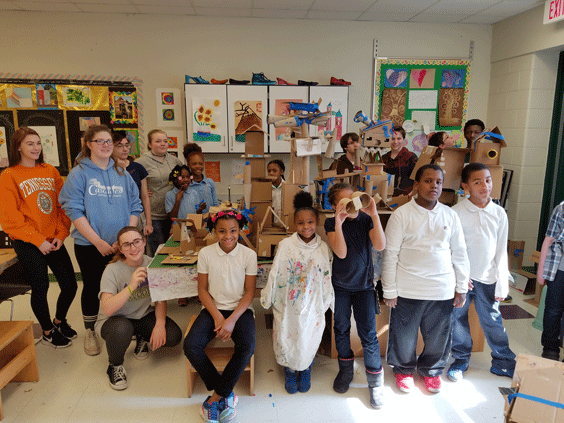
What are your hopes and goals for the future of Art Road Nonprofit?
In response to the world’s grieving in the midst of the pandemic and to honor those who have lost family members, we wrote a song, “Good Got Grief,” and are making a music video to accompany it. The concept behind the “Good Got Grief “music video is to help turn grief into good and use art as a source of healing. Our students need us now more than ever. Our goal is to raise awareness, engage our world, and bring art class back to the 22,000 students in the five Detroit schools that lack art in their curriculum. Be a part of our healing movement. We encourage people to turn their grief into good by joining us live in person or virtually on September 4th during music video production in front of the building at 12930 Denmark St. in Detroit, rain, or shine. Help us heal our students through art.
What message do you want people to take away from Art Road’s mission about the importance of having art classes in schools?
Art Road is an avenue to connect. We all inherently know what the arts do for us. When I ask the students firsthand, “what does art class mean to you?” they look at me and say “Miss Carol, art is everything, art is life, art is forever.” By exposing the students to art history and artists of the past and present, some of the kids now ask, “Miss Carol, is that a real-life artist?”
When reading a book, they are figuring out if the person they are reading about is a graffiti artist or something else. We learn so much from these young creatives. Getting the children active and engaged in the arts, Art Road is bringing art to the next generation. Hopefully, those students who find the art lessons valuable will go back to their communities and pay it forward.
We invite you to be a part of our family. Reach out to us and get involved. You can teach, donate, or volunteer. We are always looking at how we can do better. Come on board and let’s do this together. Over the course of 16 years, Art Road Nonprofit has given 16,000 Detroit students art classes at the five schools they serve. 2200 students in the 2019-2020 school year alone.
For more information on how to get involved and donate, please visit Art Road online. To learn more about the Michigan Glass Project and their glass festival fundraisers, visit their website here.
